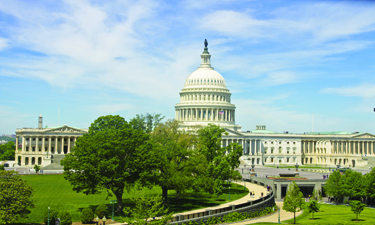 March is typically when we get back outdoors and enjoy everything that our local public spaces have to offer. It also reminds us of the important role that close-to-home parks and recreation facilities play in our communities.
March is typically when we get back outdoors and enjoy everything that our local public spaces have to offer. It also reminds us of the important role that close-to-home parks and recreation facilities play in our communities.
March also brings with it the opportunity to highlight the great work you do with your elected officials.
This year’s Legislative Forum begins March 25, and we thank those of you who will be joining us in Washington, D.C., where your advocacy makes such a difference. You’ll receive all the training and information you need to have successful meetings, which should help you become a valuable resource to your representatives and senators. Successful advocacy is an ongoing process that is done throughout the year, so our hope is that what you learn in preparation of your day on Capitol Hill will serve you and your community long after you leave D.C.
What follows is NRPA’s Legislative Platform — our public policy agenda in the areas of conservation, health and wellness, and social equity for 2014.
Conservation
Land and Water Conservation Fund (LWCF) State Assistance Program: In addition to supporting full and dedicated funding for LWCF (H.R. 2727), bipartisan legislation introduced by Rep. David McKinley (R-WV) would require that a minimum of 40 percent of annual LWCF appropriations would be allocated to the State Assistance Program.
No Child Left Inside (S. 1306/H.R. 2702): Introduced by Sen. Jack Reed (D-RI) and Rep. Paul Sarbanes (D-MD), this legislation would amend the Elementary and Secondary Education Act (No Child Left Behind). It would strengthen and expand environmental education in classrooms by providing funds to encourage partnerships between school districts and parks as well as other community-based organizations.
Healthy Kids Outdoors Act (HKOA): This legislation is expected to be reintroduced in 2014. It provides funding to states for the development of comprehensive state strategies related to expanding environmental education through the school system and finding other means of getting kids and families more physically active in the outdoors.
Health and Wellness
Health and Human Services Appropriations: NRPA supports funding for prevention programs at the Centers for Disease Control that create substantial and sustainable community-level programs that prevent and control obesity and other chronic diseases through active living, healthy eating, tobacco-free living, and clinical and community preventive services. These grant programs support state and local government entities such as park and recreation agencies.
Healthy, Hunger-Free Kids Act Reauthorization: Did you know that park and recreation agencies are the largest provider of healthy meals and snacks to children outside of schools? The Summer Food Service Program and Child and Adult Care Food Program, managed by the U.S. Department of Agriculture, provide free meals to low-income children while school is out of session and will be up for renewal in FY 2015.
Older Americans Act Reauthorization Act (S.1562): NRPA supports legislation introduced by Sen. Bernie Sanders (I-VT) to reauthorize the Older Americans Act, which addresses the health, welfare and economic needs of older individuals by promoting senior center modernizations as well as evidence-based chronic disease management and falls prevention.
Personal Health Investment Today (PHIT) Act (H.R. 956): Introduced by Rep. Ron Kind (D-WI), this bill would expand the IRS definition of medical expenditures to include physical activity as preventative medicine. This would allow individuals to use the pretax dollars in Flexible Spending Accounts and Health Savings Accounts to include expenditures such as memberships at recreation or fitness facilities, youth and adult sports league fees, exercise classes, youth camps, organized running event registration fees and other physical activities.
Social Equity
Community Parks and Revitalization (CPR) Act (H.R. 2424): Sponsored by Rep. Albio Sires (D-NJ), this legislation would provide matching federal grants for park and recreation infrastructure in metropolitan areas. Specifically, it will authorize the U.S. Department of Housing and Urban Development to provide funding to local park and recreation agencies through three grant programs: Rehabilitation and Construction, Innovation and Recreation, and Recovery Action. The bill also includes innovative financing for park infrastructure (known as PIFIA).
Urban Park and Recreation Recovery Program (UPARR): NRPA supports UPARR’s inclusion in the FY 2015 Interior Appropriations package. However, funding for UPARR should not be done at the expense of (or “in lieu of”) support for LWCF State Assistance.
MAP-21 (P.L. 112–141): NRPA supports dedicated funding for “Active Transportation” options, including trails and pedestrian projects as part of the federal surface transportation act, currently known as “MAP-21.” These programs, primarily the Transportation Alternatives Program (TAP) and the Recreational Trails Program (RTP), provide approximately $800 million annually for bike and pedestrian projects and to promote pedestrian and bicycling safety in local communities. MAP-21 is due to expire in September 2014.
The New Opportunities for Bicycle and Pedestrian Infrastructure Financing Act (H.R. 3978): Sponsored by Rep. Albio Sires (D-NJ), this bill would provide local communities with low-cost loans to build networks of sidewalks, bikes lanes and paths as part of the federal transportation financing program known as TIFIA. Twenty-five percent of the loan financing for this program must be used to help low-income communities.
Community Development Block Grants (CDBG): NRPA continues to support funding for CDBG, which historically provides up to $100 million annually for park and recreation infrastructure.
Learn how you can take action and play your part in support of NRPA’s Public Policy.
David Tyahla is NRPA’s Senior Government Affairs Manager.

